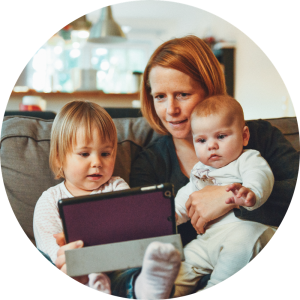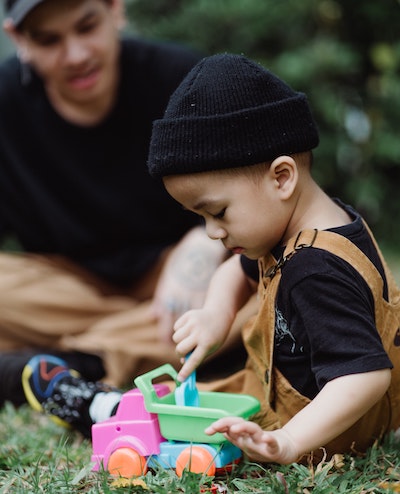 Parenting has changed a lot over the last 20 years, particularly around feeding, sleep and settling with so many new and different sources to seek information from. From podcasts to websites, vlogs and social media, there is conflicting information coming at parents from all angles. It can be overwhelming and hard to know what to believe. Unfortunately a lot of what is marketed to parents, including sleep props such as white noise, red lights and the ‘SNOO’, actually override our babies’ natural sleep instincts. Our babies are fully focussed on hunger and sleep because they need to do both every day to survive. Babies’ biological makeup has not changed over the years, but sometimes parents are so confused by all the information and gadgets out there that we miss these basic biological needs that our babies are trying to communicate to us.
Parenting has changed a lot over the last 20 years, particularly around feeding, sleep and settling with so many new and different sources to seek information from. From podcasts to websites, vlogs and social media, there is conflicting information coming at parents from all angles. It can be overwhelming and hard to know what to believe. Unfortunately a lot of what is marketed to parents, including sleep props such as white noise, red lights and the ‘SNOO’, actually override our babies’ natural sleep instincts. Our babies are fully focussed on hunger and sleep because they need to do both every day to survive. Babies’ biological makeup has not changed over the years, but sometimes parents are so confused by all the information and gadgets out there that we miss these basic biological needs that our babies are trying to communicate to us.
With this in mind, the first things I address when working with families are ‘tummy’ and ‘timings’. When I refer to ‘tummy’ I mean a nice full tummy, ensuring baby has the fuel they need to sleep well. Whether it comes from a boob, a bottle, or a spoon, babies just need to have enough in their tummy to satisfy their hunger instinct and allow their body and brain to enter deep, restorative sleep.
 Timings (awake times) are also important because sleep affects babies’ hormones, which then affects their sleep. I see many recommendations for set awake times; however the length of a baby’s awake time should be influenced by the length of the nap prior. If they have a short nap, the awake time will also need to be shortened in order to keep their hormone levels in check. The length of the nap, and hormones produced, will also dictate how happy baby will be during their next awake window.
Timings (awake times) are also important because sleep affects babies’ hormones, which then affects their sleep. I see many recommendations for set awake times; however the length of a baby’s awake time should be influenced by the length of the nap prior. If they have a short nap, the awake time will also need to be shortened in order to keep their hormone levels in check. The length of the nap, and hormones produced, will also dictate how happy baby will be during their next awake window.
Once we have addressed the tummy and timings, we can look at any parental behaviours or sleep props that may be affecting natural sleep and baby’s ability to transition from one sleep cycle to another. As babies come out of a sleep cycle they do a safety and comfort check to ensure all is well in their little world before heading back to sleep. For example, if you rock your baby to sleep, delicately place them into their cot and then find they wake 30 minutes later, the rocking is likely a sleep prop. If baby senses that their situation has changed from when they first went to sleep, they are unlikely to head into a second sleep cycle.
 A lot of people ask me whether there will be crying involved when they work with me. There are a number of reasons why babies cry, but it’s important to understand that babies don’t cry in an emotional sense like we do as adults. They may make some noise however. It typically takes 3–5 days to make behavioural change, and in those initial periods your baby may question what’s going on and make some noise, but I assure you that there is no ‘controlled crying’ or ‘cry it out’. We will have identified all the variables and ensured that all their needs are met so that we are confident that any noise is not due to genuine distress.
A lot of people ask me whether there will be crying involved when they work with me. There are a number of reasons why babies cry, but it’s important to understand that babies don’t cry in an emotional sense like we do as adults. They may make some noise however. It typically takes 3–5 days to make behavioural change, and in those initial periods your baby may question what’s going on and make some noise, but I assure you that there is no ‘controlled crying’ or ‘cry it out’. We will have identified all the variables and ensured that all their needs are met so that we are confident that any noise is not due to genuine distress.
Giving your baby the opportunity to have quality, independent sleep to ensure their long-term neurological development is the best gift you can give them. The goal is not to ‘sleep train’, as we should not have to be trained to do something that we are born with the ability to do, and which is required for survival. However, with all the confusing information out here, you may need some guidance and reassurance to get back on track.
I am happy to share some of the science-based studies that I have incorporated into my approach; please contact me if this is of interest. Sleep is truly so important and can be so much more simple than modern parenting suggests. My goal is for the saying ‘sleep like a baby’ to regain the meaning it once had! I would love to share my knowledge to get your baby sleeping as nature intended, and help you and your family get the rest you all require. Check out my packages here.
